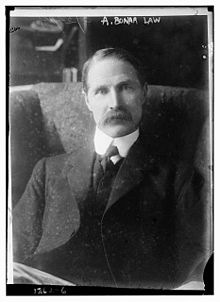
Born in Canada, Bonar-Law was briefly British Prime Minister in the 1920s. During the anti-Home Rule campaign, as leader of the Conservative Party, he toured parts of Co Antrim and Co Down around Easter 1912. He and others, including Sir Edward Carson, arrived at Comber Square around 1pm on Easter Monday. During his speech to the gathered crowd, Bonar-Law pressed an Ulster-Scots button:
'...this is the first time I have visited Ireland on a political mission, and I can assure you that firmly I believe you are determined under no circumstances to allow yourselves to be driven out of the kingdom which your fathers have done so much to build and to sustain... I know Scotland well, and I believe that rather than submit to such a fate the Scottish people would face a second Bannockburn or a second Flodden Field. (Cheers.) And how can they expect that you will submit? All that is needed is to enable the people of England and Scotland to realise with what horror you regard the change which for a party purpose they are willing to force upon you. (Cheers.) Once they have realised that they will have realised also that the Unionists here are determined that the Union shall remain long after we who are now fighting your cause have been buried in the soil beneath (Loud Cheers.)...'
He then travelled to crowded Newtownards Square. Rev William Wright later reflected on how he welcomed Law to the platform:
'...The great bulk of the people who stood around him that day were descendants of Scotsmen, holding the creed of their ancestors, of which the late William Ewart Gladstone - no mean authority in such matters - stated, when addressing their kindred in their own land: "which, whatever else may be said of it, made your forefathers a strong and determined race." That strength might have been held in reserve in the peaceful times they had had under the British Crown, or might have been allowed to manifest itself in the pursuits of peace, but it abode in the blood of the people of Ulster, and if necessity arose it was there as it was in that province and in Scotland in many a field of fight in the brave days of old...'
Bonar Law responded:
'...As has been pointed out, my father was born and is buried in your province. Even when I was a boy in Canada I remember well how proud he was, and how constantly he showed his pride in his Ulster blood - a pride which could not have been greater if he had been descended from a line of kings, instead of being, as he was, the son of the small farmer in Ulster...'
.............
Many other speeches made in the Ards at the time, all designed to motivate and mobilise the listener, referred to Scottish history and ancestry. I am sure that these references were carefully chosen for maximum effect. The Ards is an Ulster-Scots heartland and the newspaper accounts of the events of 1912 show that very clearly.
NB - It may seem strange to us that Bannockburn and Flodden were employed in 1912 in a pro-Unionist argument, as both were great battles between the armies of Scotland and England. Bonar-Law's point was not purely political, but rather to show that in years gone by people had refused to be oppressed and were willing to fight for their freedom. And by the report above of the crowd cheering, his Comber audience knew full well what he was talking about.
Saturday, September 29, 2012
Andrew Bonar-Law in Comber and Newtownards, Easter 1912; speech references to Scotland
Subscribe to:
Post Comments (Atom)



2 comments:
"That strength might have been held in reserve in the peaceful times they had had under the British Crown or might have been allowed to manifest itself in the pursuits of peace", This is such a great reference of Easter speeches for the generation and especially kids to know the historical circumstances.
Wonderful to discover this connection to Bonar Law a hero of Unionism
Post a Comment